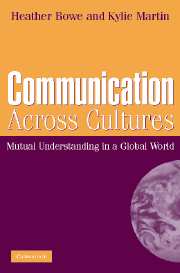Book contents
- Frontmatter
- Contents
- List of figures
- List of tables
- Transcription conventions
- Preface and acknowledgments
- Chapter 1 Culture, communication and interaction
- Chapter 2 Direct and indirect messages: The role of social context identified by Grice and Searle
- Chapter 3 Politeness and face
- Chapter 4 Speech acts and politeness across cultures
- Chapter 5 The analysis of conversation
- Chapter 6 Power relations and stereotyping
- Chapter 7 Naming and addressing: Expressing deference, respect, and solidarity
- Chapter 8 Cultural differences in writing
- Chapter 9 Interpreting and translating
- Chapter 10 Intercultural communication issues in professional and workplace contexts
- Chapter 11 Towards successful intercultural communication
- References
- Index
- References
Chapter 4 - Speech acts and politeness across cultures
- Frontmatter
- Contents
- List of figures
- List of tables
- Transcription conventions
- Preface and acknowledgments
- Chapter 1 Culture, communication and interaction
- Chapter 2 Direct and indirect messages: The role of social context identified by Grice and Searle
- Chapter 3 Politeness and face
- Chapter 4 Speech acts and politeness across cultures
- Chapter 5 The analysis of conversation
- Chapter 6 Power relations and stereotyping
- Chapter 7 Naming and addressing: Expressing deference, respect, and solidarity
- Chapter 8 Cultural differences in writing
- Chapter 9 Interpreting and translating
- Chapter 10 Intercultural communication issues in professional and workplace contexts
- Chapter 11 Towards successful intercultural communication
- References
- Index
- References
Summary
In this chapter we build on the ideas presented in Chapters 2 and 3 and examine some of the growing body of research on the inter-relatedness between direct and indirect speech acts and politeness in different cultural contexts.
One approach to research in this area involves the comparison of speech acts used by native speakers of one language with those used by native speakers of other languages in a range of parallel contexts. The CCSARP project, which examined Cross-Cultural Speech Act Realization Patterns in eight languages (Blum-Kulka, House & Kasper 1989) is a major study of this kind and is based on discourse completion tests conducted with native speakers of each language. This approach is exemplified below from parts of the CCSARP project, and also research conducted by Suszczyńska (1999).
Other research has involved language learners acquiring a second language, and has examined the extent to which their use of the second language may contain pragmatic features of their first language, or failure to comprehend pragmatic features of the second language. This area of research, which began as a branch of second language research, now forms part of the growing body of research known as Interlanguage Pragmatics (e.g. Kasper & Blum-Kulka 1993; Trosborg 1994).
The terms Intercultural Pragmatics and Intercultural Communication are being increasingly used to refer to both research involving native speakers and competent second language users, and also research involving participants from different cultures engaged in natural intercultural communication in a language that is not a first language to any of the speakers.
- Type
- Chapter
- Information
- Communication Across CulturesMutual Understanding in a Global World, pp. 46 - 60Publisher: Cambridge University PressPrint publication year: 2007



